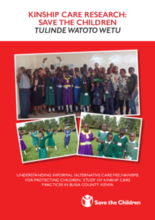Displaying 351 - 360 of 608
This article discusses literature on Reslient Therapy in addition to the results of research on how its use can be a positive tool for kinship care.
This statistical release provides information about looked after children in England for the year ending 31 March 2016, including where they are placed, their legal status, the numbers starting and ceasing to be looked after, and the numbers who go missing or are away from their placement without authorisation.
This research aimed to gain a better understanding of kinship care, its practice issues, and its role in the South Australian alternative care system.
This paper examines the emergence of a small but growing number of male caregivers who are responding to the needs of the extended family.
In this research paper Asnakech Tesfaye explores the expectations of Ethiopian children applying for an Australian Orphan Visa. Tesfaye’s research found children applying for visas expected to get better education, employment, material benefits and living conditions.
Using data from a national longitudinal survey of children referred to child protective services (NSCAW II), this article compares behavioral, child/caregiver relationship, and school performance outcomes for children residing in kinship and nonkinship settings.
This study explores the determinants of child-parent separation and the consequences of existing alternative care arrangements from the perspectives of adults and young people in Laos.
Children and young people, many from conflict-affected countries, who arrive in Australia on orphan relative visas are highly vulnerable. In this book by David Rose and Klaus Serr, professionals with experience of working in this field discuss their perceptions of the needs of these young people and their carers.
This animated video describes Indonesia's Families First Signature Program which began in 2005. The goal of Families First is to ensure that every child in Indonesia has a safe, family environment, recognizing that family-based care is best for child development. The video describes how the Signature Program has helped shift care away from institutions towards family-based care.
This participatory research confirms that kinship care is widely practiced in many Kenyan communities as noted through the participatory engagement with communities in Busia County.


